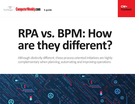Deloitte RPA Case Study: How Deloitte Reduced Preparation Time From Days to minutes with RPA software
By: IBM View more from IBM >>
Download this next:
Deloitte Global CIO Survey 2018 – UK Edition
By: TechTarget ComputerWeekly.com
Type: Research Content
CIOs may need to re-arrange their talent model to support digital transformation and rebalance their organisation’s technology capabilities as new innovations come to market.
This is a critical moment for the 55% of CIOs whose primary role is to maintain technology infrastructure – a role that will likely become obsolete. The report identifies the traits they need to shift to leading business growth and digital transformation.
These are also closely related to: "Deloitte RPA Case Study: How Deloitte Reduced Preparation Time From Days to minutes with RPA software"
-
Deloitte CIO survey 2016-2017 – UK Edition
By: TechTarget ComputerWeekly.com
Type: Essential Guide
Deloitte’s 2016–2017 global survey of CIOs, UK edition, takes a step forward in understanding of how CIOs create legacy - the value and impact technology leaders deliver to their organisations.
The survey explores the extent to which CIO personality traits (“nature”) influence legacy more or less than technology capabilities (“nurture”). It also explore the gaps between IT capabilities and business expectations and the agility of CIOs to realign their capabilities to their business needs. Finally, it analyses the idea of the “digital iceberg” and how CIOs are better positioned than any other occupant of the C-suite to drive digital across the entire organisation.
The survey uncovered a shift in business priorities from “business performance” to “customers,” with 57% of CIOs choosing “customers” as their top priority, compared to 45% in last year’s survey. “Customer” remained the top priority for eight of the 10 industries represented in the survey. However, only 45% of CIOs stated their information technology organisation is involved in delivering customer experience through IT capabilities, and 28% of CIOs feel their IT organisations are below average in their digital skill sets.
-
RPA vs. BPM: How are they different?
By: TechTarget ComputerWeekly.com
Type: eGuide
Robotic process automation and business process management are complementary partners in driving digital transformation initiatives. RPA has received a lot more publicity in recent years, but BPM is an essential discipline and a key enabler in scaling RPA projects.
RPA differs from BPM in several ways, but most significantly, RPA automates a specific set of tasks while BPM determines what tasks to automate and the steps needed to eliminate and consolidate those tasks.
In this e-guide, we look into the main differences between these process-oriented initiatives and how they can complement each other when planning, automating and improving key business operations.
Find more content like what you just read:
-
Infographic: 5 benefits of RPA
By: TechTarget ComputerWeekly.com
Type: Infographic
Although hard data on the benefits and drawbacks of robotic process automation (RPA) vary from study to study, some aspects are constantly mentioned by companies that have successfully deployed RPA. From reducing costs to boosting productivity, here are five ways enterprises can improve their business processes through robotic automation.
-
How RPA and machine learning work together in the enterprise
By: TechTarget ComputerWeekly.com
Type: eGuide
More enterprises have adopted RPA functions to automate rote, repetitive tasks, but sometimes they need more capabilities. Enter machine learning functions and the result is "intelligent automation" which, unlike RPA, can learn and adapt.
-
The ultimate guide to Robotic Process Automation (RPA)
By: TechTarget ComputerWeekly.com
Type: eGuide
Robotic process automation is a hot commodity in today's enterprises -- its impact has been described as transformational and disruptive. Still, RPA software is not without risks. In this e-guide, we explain everything you need to know for a successful RPA implementation, from the basics to analysis of where this rapidly evolving market is headed.
-
Computer Weekly – 13 April 2021: The evolution of RPA
By: TechTarget ComputerWeekly.com
Type: Ezine
In this week's Computer Weekly, our latest buyer's guide looks at the future of robotic process automation (RPA). Google's legal victory against Oracle over the use of Java APIs has huge significance for software developers. And we find out how expectations of IT have grown as firms prepare for the post-Covid workplace. Read the issue now.
-
A Computer Weekly buyer's guide to AI, ML and RPA
By: TechTarget ComputerWeekly.com
Type: eGuide
In this 16-page buyer's guide, Computer Weekly looks at the evolution of productivity bots, the pros and cons of putting AI and ML applications in the cloud, and the growing number of injustices involving algorithms and automated decision-making
-
RPA bots compared: Unattended vs. Attended vs. Hybrid
By: TechTarget ComputerWeekly.com
Type: Infographic
Robotic process automation (RPA) bots can be divided into three modes -- unattended, attended and hybrid -- depending on how they operate within the enterprise. In this infographic, we compare the main similarities and differences between the three modes and examine how organizations can benefit from each of them.
-
CW Innovation Awards: NUHS taps RPA in Covid-19 swab tests
By: TechTarget ComputerWeekly.com
Type: eGuide
In this case study, learn how Singapore's National University Health System deployed RPA bots to automate patient registration during Covid-19 swab tests as part of broader efforts to improve efficiency.


